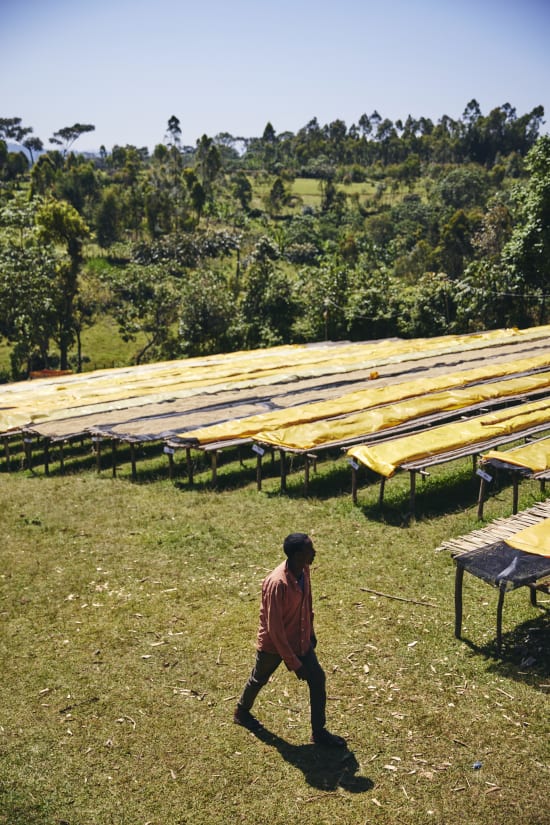Ethiopia - Yaye - Special Prep Natural Heirloom
Ethiopia - Yaye - Special Prep Natural Heirloom
Couldn't load pickup availability
Origine: Sidama, Ethiopia
Variety: 74158
Process: Natural Special Prep
Elevation: 1,995 - 2,300 MASL
The Yaye Washing Station, built in 2021, is dedicated to quality through experimentation. The Odakko project is the culmination of their four years of study and pre-harvest planning between Testi Coffees and Cafe Imports. The aim was to create a traceable, single-variety offering using the most intentionally selected cherry possible at the peak harvest to discover a one-of-one flavor profile. This novel coffee is the product of 50 smallholders from neighboring villages of Yaye and Chericho.
Yaye Washing Station is equipped with immaculate washing facilities, hundreds of raised beds, and numerous fermentation barrels, all ready to process coffee from the hundreds of growers in the surrounding villages. Attention to detail has put Yaye on the specialty coffee map. Along with its focus on quality, Testi Coffee is also committed to serving the coffee-growing communities surrounding their washing stations throughout the country. Testi emphasizes education, building schools, and providing school supplies to the youth. The Odakko Project premium goes toward this social program.
Testi estimates that 40% of green defects are caused by contaminants or exposure to harmful fungi during processing, so cleanliness is prioritized at every step. All Yaye staff wash their hands and all equipment, including floater tanks, picking baskets, drying beds, and shade nets, before coffee passes through. The coffee cherries themselves are washed with potable water, rather than river water. Clean processing creates a clean cup.
The Odakko Project cherry was collected from producers at elevations ranging from 2150 to 2300 MASL within a 10-km radius of the washing station, who were all identified as growing the 74518 variety. To manage the processing logistics, the coffee was harvested over a four-day period. Each day’s yield was collected between 3:00 and 7:00 PM to prevent uncontrolled fermentation. The cherries were immediately transported to Yaye and immersed in water, where any floaters were removed. The cleaned cherries were then poured onto the drying beds, 300 kilos per bed, and sorted by hand to a strict tolerance of 95% full-ripe and 5% overripe to balance sugar content and complexity.
After sorting, the raised beds were covered with a shade net to slow down the drying process. In fact, the drying beds used are situated in an area of greater wind circulation and less direct sunlight compared to the rest of the station’s drying beds. This extends the drying time to 28 days, carefully reducing the seed’s moisture content to an optimal 12%, maximizing flavor development, transformation, and preservation. Following the 28 days, the dried cherries are removed from the raised beds and rested for six weeks before being delivered in air-tight GrainPro bags to Testi’s mill in Addis Ababa. Every step is deliberate, resulting in cups with notes of jammy red fruit balanced by dark chocolate, red wine acidity, and mild sugary sweetness.
Natural Special Prep
With the special prep (what the producers generally call “Premium” in Ethiopia) the cherries are collected from a limited number of small-holder farmers.
90% of the cherries are perfectly picked, the right red color. 5% semi red and 5% overripe. All of it is processed and stored it separately from the other lots. They generally produce a very small number of bags in this way every year.
In most instances, cherries used to produce these lots are collected from a day lot (picked in one day).
Natural coffees in Ethiopia are first sorted for ripeness and quality before being rinsed clean Then they are spread on raised drying beds or tables, where they will be rotated constantly throughout the course of drying. Drying can take an average of 8–25 days, depending on the weather.
Variety 74158
Variety 74158 belongs to a group of selections from the Jimma Agricultural Research Center (JARC). The “74” prefix refers to the year of selection (1974), and “158” is the accession number. This system was used to catalog and identify disease-resistant or agronomically promising accessions collected from the wild or farmers’ fields.
Expecting Taste Notes
Winey and floral
Bergamot, Blackberry, Apricot
We roast on every Monday and dispatch on Tuesday.
View full details

